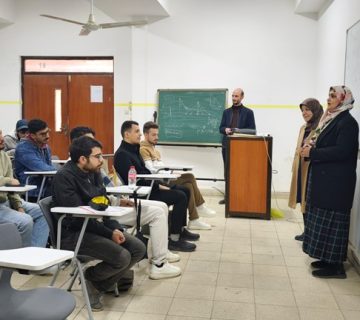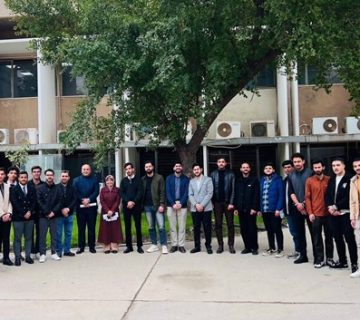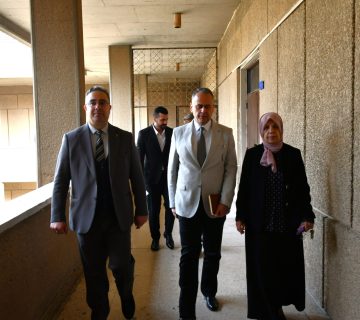College of Engineering \University of Baghdad, held MSc thesis examination titled
“Effect of Recycled Coarse Aggregate on Some Properties of No-Fine Aggregate Concrete”
By student Roaa Kasim and supervised by Prof. Hadeel Khaled, the examination committee consisted of prof.Dr. Nada Mahdi as chairman , and membership of Asst. prof. dr.Zena K. Abbas , Assist. prof.Dr.Abdul Kader . After conducting the public discussion and listening to the student’s defense, the thesis was accepted with Excelent degree . The thesis was summarized as follow:
Abstract
No-Fines concrete is a porous structural material produced from cement,
water, and coarse aggregate. It has a large number of voids, which results in its
lightweight and low strength. No-fine concrete has lower compressive strength,
higher permeability and a lower density compared to conventional concrete. Due
to its density and porosity, no-fines concrete has been utilized in constructing
pavements since it is a cost-effective material. It permits rainwater to penetrate
into the ground, recharging the aquifer. Moreover, it is employed in the
construction of partitions and insulation.
This research aims to investigate the influence of silica fume and
polypropylene fiber on the properties of no-fine concrete with recycled aggregate.
After several trail mixes the ratios of water to cement and cement to aggregate
were chosen to be 0.3 and 1:4, respectively. The recycled aggregate was
demolished reactive powder concrete used in the percentages of 10%, 20%, and
30% as a substitution for coarse aggregate by volume. The recycled aggregate
percentage of 10% was optimal as it shows the least adverse effect on the no-fine
concrete mixes mechanical properties. The polypropylene fiber was then added
to the no-fine concrete mixes with 10% recycled aggregate in the proportions of
0.5%, 1%, and 1.5% by volume. The optimum percentage of polypropylene fiber
was 0.5%, which improved compressive strength, splitting tensile strength, and
flexural strength by 14.92%, 29%, and 28%, respectively, when compared it to
no-fine concrete mix with 10% recycled aggregate. Silica fume was used as a
partial substitution for cement in the proportions of 5%, 8%, and 10%. The best
percentage of silica fume was 10%, which enhances the compressive strength,
splitting tensile strength, and flexural strength at 28 days by 31.75%, 18%, and
20%, respectively, compared to no-fine concrete mix with 10%. The results show that by using 0.5% polypropylene fiber and 10% silica fume with 10% recycled
aggregate, led to a significant increase in compressive strength, splitting tensile
strength, flexural strength, and modulus of elasticity by 21% and 35.37%,
40.32%, 35%, and 38.19%, respectively, compared to no-fine concrete mix with
10%, While decrease the slump and compacting factor, by 6.13% and 5.68%,
respectively, compared to no-fine concrete mix with 10%. The fresh density was
lower by 0.2% and the dry density higher by 0.6%compared to no-fine concrete
mix with 10%, while the water absorption was lower by 5.1% compared to no-fine concrete mix with 10%







